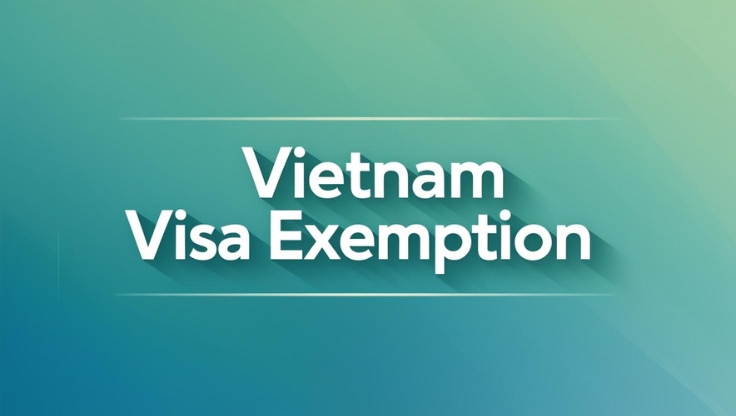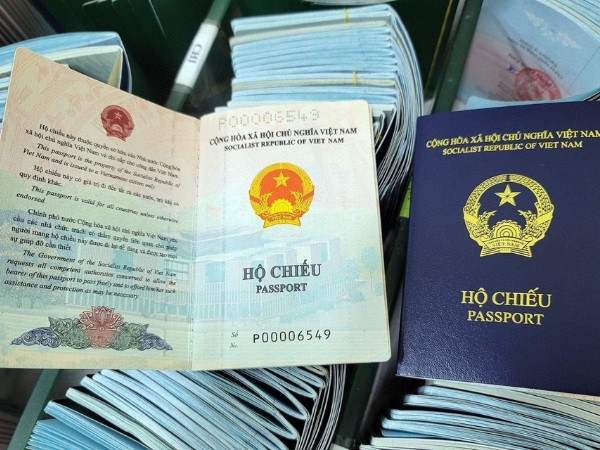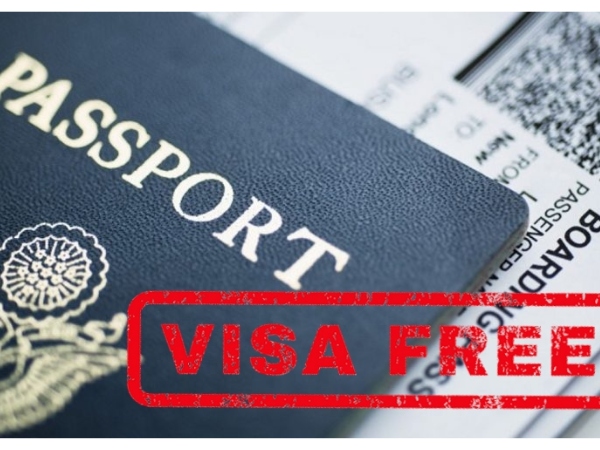Vietnam Visa Exemption
The Vietnam visa exemption is a helpful policy. It lets citizens from many countries visit Vietnam without applying for a visa first. But do you know how many countries are currently eligible for this exemption? Let Wexplore Vietnam guide you through the details in the article below!

What is the Vietnam Visa Exemption?
Vietnam visa exemption means that foreign citizens can enter and stay in Vietnam for a set time. They do not need to get a visa for this.
This policy relies on visa exemption agreements. These agreements can be bilateral or unilateral. The Vietnamese government signs agreements with each country.
Vietnam Visa Exemption countries
According to Article 1 of Resolution 128/NQ-CP of 2023, some countries can enter Vietnam without a visa. These countries will have visa-free entry starting on August 15, 2023, are:
Unilateral visa exemption
Vietnam gives visa exemptions to citizens from 26 countries with free 14-90 days stay in Vietnam . These countries are:
| No. | Country | Maximum visa-free duration | Applicable purpose of visit (if any) |
| 1 | Chile | 90 days | Entries that do not include remunerated activities |
| 2 | Panama | 90 days | Entries that do not include remunerated activities |
| 3 | Cambodia | 30 days | Not mentioned |
| 4 | Indonesia | 30 days | Not mentioned |
| 5 | Kyrgyzstan | 30 days | Not mentioned |
| 6 | Laos | 30 days | Not mentioned |
| 7 | Malaysia | 30 days | Not mentioned |
| 8 | Singapore | 30 days | Entries that do not include remunerated activities |
| 9 | Thailand | 30 days | Not mentioned |
| 10 | Philippines | 21 days | Not mentioned |
| 11 | Brunei | 14 days | Not mentioned |
| 12 | Myanmar | 14 days | Visiting only |
| 13 | Belarus | 45 days | Not mentioned |
| 14 | Denmark | 45 days | Not mentioned |
| 15 | Finland | 45 days | Not mentioned |
| 13 | France | 45 days | Not mentioned |
| 17 | Germany | 45 days | Not mentioned |
| 18 | Italy | 45 days | Not mentioned |
| 19 | Japan | 45 days | Not mentioned |
| 20 | Norway | 45 days | Not mentioned |
| 21 | Russia | 45 days | Not mentioned |
| 22 | South Korea | 45 days | Not mentioned |
| 23 | Spain | 45 days | Not mentioned |
| 24 | Sweden | 45 days | Not mentioned |
| 25 | United Kingdom (Not applicable to BNO) | 45 days | Not mentioned |
| 26 | Kazakhstan | 30 days | Not exceeding 90 days within 180 continuous days |
| 27 | Poland | 45 days | Effective from 01/Mar/2025 |
| 28 | Czech Republic | 45 days | Effective from 01/Mar/2025 |
| 29 | Switzerland | 45 days | Effective from 01/Mar/2025 |
| 30 | Belgium | 45 days | Effective from 01/Aug/2025 |
| 31 | Bulgaria | 45 days | Effective from 01/Aug/2025 |
| 32 | Croatia | 45 days | Effective from 01/Aug/2025 |
| 33 | Hungary | 45 days | Effective from 01/Aug/2025 |
| 34 | Luxembourg | 45 days | Effective from 01/Aug/2025 |
| 35 | Netherland | 45 days | Effective from 01/Aug/2025 |
| 36 | Romania | 45 days | Effective from 01/Aug/2025 |
| 37 | Slovakia | 45 days | Effective from 01/Aug/2025 |
| 38 | Slovenia | 45 days | Effective from 01/Aug/2025 |
Bilateral visa exemption
A bilateral visa exemption is an agreement between two countries. It lets citizens of each country enter, stay, and leave the other country without applying for a visa before their trip. The bilateral visa exemption lasts for no more than 30 days.
| Order | Country | Date of entry into force | Categories of passports covered |
| 1 | Argentina | 13/11/1999 | Diplomatic passports, official passports |
| 2 | Albania | 1/10/1956 | Diplomatic passports, official passports, and group passports for official mission |
| 3 | Algeria | 02/01/1995 | Diplomatic Passports, Official passports |
| 4 | Afghanistan | 26/2/1988 | Diplomatic Passports, Official passports |
| 5 | Bangladesh | 10/7/1999 | Diplomatic Passports, Official passports for Vietnamese citizens
Diplomatic passports and Passports with “official” seal for Bangladesh citizens |
| 6 | Belarus | 24/11/1993 | Diplomatic Passports, Official passports |
| 7 | Brazil | 12/2/2005 | Diplomatic passports |
| 8 | Brunei | 1/11/1997 | Diplomatic Passports, Official passports |
| 9 | Bulgaria | 1/6/1966 | Diplomatic Passports, Official passports; Group Passports or Ordinary Passports for official mission |
| 10 | Cambodia | 30/11/1979 | Diplomatic and Official passports; Diplomatic and Official Lassez-passezs |
| 11 | Chile | 25/6/2005 | Diplomatic Passports, Official passports |
| 12 | China | 15/3/1992 | Diplomatic passports, official passports, and ordinary passports for official mission |
| 13 | Cuba | Currently in force | Diplomatic passports, Ordinary passports, ordinary passports for official mission, and seaman’s Passports for Vietnamese citizens
Diplomatic passports, official passports, service passports, or Maritime Passports for Cuban citizens |
| 14 | Czech | 13/2/2000 | Diplomatic passports, Official passports |
| 15 | Dominica | 29/9/2007 | Diplomatic passports, Official passports |
| 16 | Ecuador | 29/9/2007 | Diplomatic passports, Official passports |
| 17 | France | 1/7/2005 | Diplomatic passports |
| 18 | Hungary | 1/8/1993 | Diplomatic Passports, Official passports |
| 19 | India | 23/3/1995 | Diplomatic Passports, Official passports |
| 20 | Indonesia | 19/9/1998
4/12/2003 |
Diplomatic Passports, Official passports
Ordinary Passports with valid periods of at least 6 months |
| 21 | Iran | 1/6/1994 | Diplomatic passports |
| 22 | Iraq | 1/12/2001 | Diplomatic Passports, Official passports |
| 23 | Japan | 1/5/2005 | Diplomatic passports, Official passports |
| 24 | Kyrgyzstan | Currently in force | Diplomatic passports, Official passports, and ordinary passports for official mission |
| 25 | Laos | 17/7/1977
05/3/2004 |
Diplomatic passports, official passports, ordinary passports for official mission,
Ordinary Passports with valid periods of at least 6 months |
| 26 | Malaysia | 25/11/2001 | Diplomatic passports, Official passports, and ordinary passports |
| 27 | Mexico | 4/2/2002 | Diplomatic passports, Official passports |
| 28 | Moldova | 23/5/2003 | Diplomatic passports, Official passports |
| 29 | Mongolia | 6/2/2000 | Diplomatic passports, Official passports |
| 30 | Montenegro | 1/9/2000 | Diplomatic passports, Official passports, and special passports |
| 31 | Morocco | 19/12/2004 | Diplomatic passports, Official passports, and special passports |
| 32 | Mozambique | 9/2/2009 | Diplomatic passports, Official passports |
| 33 | Myanmar | 11/8/1998 | Diplomatic passports, Official passports |
| 34 | Nicaragua | Currently in force | Diplomatic passports, Official or Service passports |
| 35 | Pakistan | 2/3/2007 | Diplomatic passports, Official passports |
| 36 | Panama | 4/11/2002 | Diplomatic passports, Official passports for Vietnamese citizens
Diplomatic passports, Official passports, Special Passports, and consular passports |
| 37 | Democratic People’s Republic of Korea |
01/10/1956
01/4/1966 |
Diplomatic Passports, Official passports; and group passports for official mission
Ordinary Passports for official mission |
| 38 | Peru | 2/6/2006 | Diplomatic passports, Official passports for Vietnamese citizens
Diplomatic passports, Special passports for Peruvian citizens |
| 39 | Philippines | 19/02/1997
16/2/1999 1/4/2000 |
Diplomatic passports
Official Passports, Holders of Ordinary Passports having an invitation to join ASEAN activities organized by ASEAN Secretariat or Government agencies Ordinary Passports with valid periods of at least 6 months, together with return air tickets or air tickets for leaving the country |
| 40 | Paraguay | 26/10/2008 | Diplomatic Passports, Official passports |
| 41 | Romania | 1/12/1956 | Diplomatic Passports, Official passports; Group Passports or Ordinary Passports for official mission |
| 42 | Russia | 20/2/1994 | Diplomatic passports, Official passports |
| 43 | Serbia | 1/9/2000 | Diplomatic passports, Official passports |
| 44 | Singapore | 10/5/1997
01/12/2003 |
Diplomatic Passports, Official passports
Ordinary Passports with valid periods of at least 6 months, together with return air tickets or air tickets for leaving the country |
| 45 | Slovakia | 10/8/1992 | Diplomatic Passports, Official passports |
| 46 | South Africa | 23/6/2007 | Diplomatic Passports, Official passports |
| 47 | Republic of Korea | 13/1/1999 | Diplomatic Passports, Official passports |
| 48 | Sri Lanka | 19/9/2003 | Diplomatic passports, Official passports |
| 49 | Thailand | 10/5/1997
9/7/2000 |
Diplomatic Passports, Official passports
Ordinary Passports |
| 50 | Tunisia | 20/1/2009 | Diplomatic Passports, Special passports |
| 51 | Turkey | 1/10/1998 | Diplomatic Passports |
| 52 | Ukraine | 6/12/1993 | Diplomatic Passports, Official passports |
| 53 | Uruguay | 15/6/2008 | Diplomatic Passports, Official passports |
| 54 | Venezuela | 17/11/2006 | Diplomatic Passports, Official passports |
Other Vietnam Visa Exemption Cases
Foreign citizens of Vietnamese origin or those with family ties to Vietnamese people can get a 5-year visa exemption. This applies to all nationalities.
These citizens must complete an application for the 5-year visa exemption. They will receive a 90-day visa exemption each time they enter Vietnam. After the exemption period expires, they can apply for a renewal of the visa exemption certificate.
Vietnam also provides visa exemptions for foreign visitors entering Phu Quoc from abroad with a 30-day stay duration. This policy applies even if travelers pass through an international gateway in Vietnam. This can be by air or sea before they continue to Phu Quoc Island.
Holders of the APEC Business Travel Card (ABTC) with a valid passport do not need a visa for Vietnam. This is true if their stay is 60 days or less. If you wish to extend your stay in Vietnam without leaving the country, please refer to the ABTC exemption for stays in Vietnam.
Conditions for Making Vietnam Visa Exemption
To be eligible for Vietnam visa exemption, travelers must meet the following requirements:
- The passport must be valid for at least 6 months.
- Maximum stay in Vietnam should not exceed 14-45 days (or as per the regulations of the country).
- Have a return ticket or a ticket to another country.

Vietnam Visa Exemption Extension
People who want to stay in Vietnam longer than the current exemption period must go to a nearby country. This can be Thailand, Cambodia, or Laos. After that, they can return to Vietnam with a new visa exemption. People commonly refer to this method of extending the stay as a “visa run.”
When to use the Vietnamese visa exemption policy?
Vietnam’s visa exemption policy is great for people planning a short trip. This includes trips for tourism or business.
If you do not qualify for a visa exemption, you can apply for a visa. You can do this at the Vietnamese embassy or consulate in your home country. Alternatively, you can choose an evissa or a visa on arrival.
How to speed up arrival procedures with Vietnam visa exemption?
Entering Vietnam with a visa exemption is easy. Travelers can enter through international airports, land borders, or seaports. To expedite the entry procedure with visa exemption in Vietnam, you can follow these steps:
- Check if your country is eligible for visa exemption.
- Ensure your passport is valid for at least six months.
- Book a flight to one of Vietnam’s international airports.
- Complete the immigration form upon arrival or evisa online form.
- Ask the immigration officer to stamp your passport.
Pros and Cons of Using Vietnamese Visa Exemption Policy
Travelers do not need to apply for a visa prior to entry, which simplifies administrative procedures. This is particularly convenient for short-term trips, such as tourism or business, where the stay is not too long. Additionally, the visa exemption policy helps promote tourism and business, creating opportunities for commercial activities and cultural exchange between Vietnam and other countries.

However, the visa exemption policy also has some limitations. The maximum stay is 14-45 days, which may not be suitable for travelers who wish to stay longer. This policy does not apply to citizens of all countries, requiring some travelers to apply for a visa.
Visitors must meet Vietnam’s entry requirements. They cannot extend their stay or change to a different type of visa if they need more time.
Alternatives to Vietnamese Visa Exemption Policy
If you don’t qualify for Vietnam’s visa exemption or want to stay longer than 14-45 days, you have other visa options.
- Apply for a visa at the Vietnamese embassy or consulate in your home country.
- Obtain a visa on arrival through a travel agent or online service.
- Apply for an e-visa online.
Comparison of Vietnam’s Visa Options
This table summarizes the main differences in terms of duration, application method, availability, and fees for each visa option.
| Visa Type | Duration | Application | Availability | Fees |
| Visa Exemption | Up to 14-45 days | No application needed | Only available to citizens of certain countries | Free of charge |
| Visa on Arrival | Up to 90 days | Can be applied for online or through a travel agent | Available to all nationalities | Varies depending on agent and nationality |
| E-Visa | Up to 90 days | Must be applied for online | Available to most nationalities | Fixed fee of $25 or $50 |
| Embassy/Consulate Visa | Duration depends on embassy/consulate | Requires in-person application at the embassy or consulate | Available to all nationalities | Varies by embassy or consulate |
Tips for Using Vietnamese Visa Exemption Policy
Here are some useful tips to take advantage of Vietnam’s visa exemption policy. This will help you avoid problems during your trip:
- Make sure your passport has at least six months of validity remaining from your arrival date.
- Prepare a return or onward ticket to demonstrate your plan to depart Vietnam within the allowed period.
- Verify the list of eligible countries for visa exemption before finalizing your travel plans.
- It’s smart to keep a printed copy of your accommodation and travel itinerary. This way, you can show it if immigration officers ask for proof of your stay.
FAQs (Frequently Asked Questions)
Here are some frequently asked questions when you are looking to learn about Vietnam’s visa exemption.
Is it possible to enter Vietnam without a visa?
Yes, if you are from a country eligible for visa exemption and fulfill the entry requirements.
Can I stay in Vietnam for more than 14-45 days with a visa exemption?
No, the maximum stay allowed under the visa exemption policy is 14-45 days (or as determined by your nationality).
Is it possible to extend my visa exemption while in Vietnam?
No, you cannot extend the visa exemption or convert it to a different type of visa.
Can I obtain a visa on arrival in Vietnam?
Yes, travelers can apply for a visa on arrival through a travel agent or an online service.
How much does a Vietnamese visa cost?
The cost of a Vietnamese visa depends on factors such as the visa type, nationality, and application process.
Hopefully the above article has helped clarify information related to Vietnam visa exemption. In case you need support for this service, feel free to let us know at our hotline/Zalo/Whatsapp/ +84.904.879.729 or our email [email protected].
>>> Read more: Urgent Vietnam Visa Within 1-2 Hours Everyday

